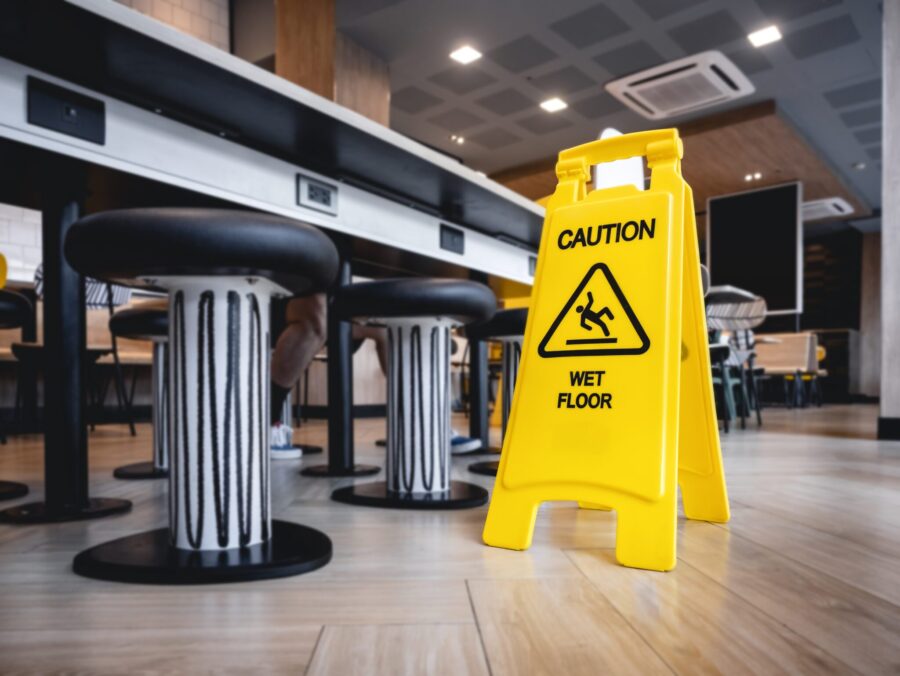No small business owner can see into the future, so there’s no way to prevent every potential accident or other incident that might result in a substantial claim for monetary damages. But, liability insurance can provide financial protection when someone files a lawsuit or makes a claim against a small business.
Every business, no matter the industry, faces significant financial risks from liability. This article will provide a basic overview of liability insurance: what it is, how much it costs and how this essential form of small business insurance can be refined for enterprises of every size and structure.
What is liability?
At its core, the concept of liability means that a business can be held legally responsible for causing someone to suffer a loss or injury. A small business is generally deemed to be responsible for the condition and operation of anything that is on the company premises or is otherwise under the control of the business.
If something is unsafe and should have been secured, if something is broken and should have been fixed or if someone is engaged in unsafe behavior and should have been corrected, the business may be liable. For example, a small business may be found liable for a broken railing in the office stairwell or the unsafe operation of equipment on a remote worksite.
General Liability Insurance
General liability insurance, also referred to as commercial general liability (CGL) or business liability insurance, can protect a small business from a wide variety of claims, including property damage, bodily injury or even harm to the reputation of another person or business.
Below are some examples of common small business liability claims that might be covered under a business insurance general liability policy.
Liability for Bodily Injury
Employee injury claims would be workers’ compensation issues. However, when a customer, visitor or other non-employee is injured on company-controlled property or by a person acting on behalf of the company, workers’ compensation insurance does not apply. Claims for bodily injury may include medical expenses and loss of income, as well as recovery of the legal costs for filing and pursuing the claim.
One common claim for bodily injury is when a customer is injured by a slip-and-fall. This might happen to a shopper in a grocery store, a visitor in an office building or even a passerby on a slippery sidewalk.
Liability for Property Damage
While commercial property insurance covers damage to the company’s buildings and contents, liability insurance covers damage to other people’s property. In general, a business can be held liable for property damage that occurs on the company premises, while working at the customer’s home or business property or in a neutral location.
Again, the business would be liable if the property damage was caused by a condition on the business premises, by an operation at the customer’s location or by the actions of an employee in any location. For example, a house painter would be liable for spilling paint on a valuable antique desk, or a small business employee would be liable for causing damage to a supplier’s loading dock during a pickup.
Liability for a Defective Product
Every business that manufactures a product must be protected by product liability insurance. A product liability claim can arise from a design that is deemed unsafe, a manufacturing defect or a failure while the product is in use. In any of these cases, a faulty product could cause injury, illness or damage to property, and the financial damages from a product liability claim can be very substantial.
A defective product that injures someone can result in the manufacturer being held liable for medical expenses, lost wages, legal fees and, in some cases, damages for pain and suffering. If the product has been widely sold, the company could also be liable for the costs of a recall, if one is ordered by a court or by a government agency regulating that industry.
Liability for Advertising Injury
Advertising injury, also called personal and advertising injury, refers to a claim that statements in the advertising or other communications of the business caused harm to the reputation of another party. The damages or harm resulting from personal and advertising liability might include libel, slander or copyright infringement.
Slander is when a person or business is harmed by derogatory and untrue statements made about them. Libel is when harmful statements are made in writing, such as in advertising or social media posting. Invasion of privacy is harm caused by the disclosure of private information, and misappropriation of advertising ideas is when one business copies another company’s language or style of advertising.
Special Coverage for Special Risks
A commercial general liability insurance policy provides broad coverage for the most common liability risks. However, many small businesses choose to supplement general business liability insurance with specialty industry coverage. This offers extensions for special risks arising from unique aspects of their industry, business model or operating practices. Examples of more specialized commercial insurance policies include:
Construction Equipment
Contractors must frequently move tools, equipment and other business assets to a customer job site or a storage location. Equipment in transit or in storage may not be covered by the owner’s commercial property insurance. Construction insurance and builders’ risk insurance can provide targeted business insurance coverage designed to manage the unique liability risks of transporting, storing and installing tools and equipment.
Cyber Liability
A cyberattack leading to the break of private data could expose a business to claims of monetary or reputation damage from a customer, employee or other stakeholder. The business could also be answerable to government regulators who might impose fees or require remedial actions. This threat is why cyber liability insurance is an increasingly popular form of commercial insurance coverage. This type of insurance can help cover the costs of defending a claim, a judgment against the company, a fine from regulators or the cost of complying with regulatory requirements.
Employee Benefits Liability
A simple oversight in employee benefits administration can be costly. For example, if a company makes an error in enrolling an employee and the employee later has a medical expense that should have been covered by their health insurance, the company could be sued for damages. Benefits liability insurance offers extra protection to cover any such occurrence and is particularly important for small businesses offering employee benefits.
Employment Practices Liability Insurance
A business owner has no way to predict whether their team leaders know how to avoid or respond to unlawful workplace behavior. An otherwise well-meaning supervisor might cause the company to be charged with discrimination, sexual harassment, wrongful termination or unlawful hiring practices. These risks can be mitigated over time with thorough training, but in the meantime, the risk can be managed with employment practices liability insurance (EPLI).
Liquor Liability
Restaurants, bars, breweries or wineries that serve alcohol face liability risks that are unique to their industries. The business owner is responsible for confirming that servers are of age and are properly qualified to sell or serve liquor. An intoxicated customer must not be negligently served. All patrons must be protected from any aggressive behavior of others and their safety must extend from inside the business, to the parking lot and the drive home. Liquor liability insurance helps protect a small business from risks such as these.
Medical Malpractice
Many doctors and dentists are small business owners with a high degree of exposure to liability. Whenever a treatment outcome is less than 100 percent successful, there is the possibility that a patient will claim that a subsequent problem is the result of malpractice.
In many states, a doctor is only required to carry $100,000 in malpractice insurance, or if they see patients in a hospital, $250,000. Of course, these amounts are a fraction of the large sums that could be sought in an actual malpractice claim. Accordingly, most physicians carry medical practice insurance of at least $250,000 per claim and $750,000 aggregate.
Liability for Auto Accidents
Many states have no-fault automobile insurance, which may cover both vehicles in a crash without regard to which driver caused the accident. However, one party involved in an auto accident may subsequently sue the other for costs that were not covered by their auto insurance. These costs might include vehicle damage beyond coverage limits, vehicle rental, damage to cargo, lost business use of the vehicle or other claims.
For example, in an accident between a passenger car and a company truck, the truck cargo breaks loose and causes extensive damage to the car. The car owner may claim that the business that owns the truck was negligent in loading the cargo and, regardless of whether they were at fault in causing the accident, claim that the business is liable for the reimbursement of the car owner’s deductible and other costs which were not covered by their collision insurance. In many cases, an auto accident liability claim arises after the insurance companies for both drivers have resolved the regular collision and comprehensive claims and are seeking to subrogate other losses.
These risks associated with operating company-owned or company-associated vehicles make having adequate commercial auto insurance essential for every small business owner.
Non-owned Auto Liability
When a small business needs to rent vehicles or ask employees to use their own vehicles for business purposes, the addition of business insurance coverage for non-owned vehicles can provide the necessary protection for this type of driving, rather than purchasing a commercial auto insurance policy.
Professional Liability Insurance
Many professionals, such as lawyers, accountants, bankers and real estate agents must carry professional liability insurance in case of damages which are caused by any errors or omissions in the conduct of their practice.
Combined Coverage with a Business Owner’s Policy (BOP)
A business owner’s policy, also known as a BOP, is an insurance package that combines commercial property insurance with general liability insurance and may also include other types of business insurance, such as business interruption insurance, fraud/theft/forgery insurance, cyber liability, errors and omissions insurance, limited equipment breakdown coverage, personal and advertising liability, non-owned vehicles, professional liability insurance, employment practices liability and workers’ compensation insurance.
The Potential Cost of Going Without Liability Insurance
If a business has no liability insurance and there is a claim, the first expense item will be lawyers to help the company defend against the claim. Legal guidance in a lawsuit is essential because most settlements are negotiated between lawyers without ever going to court.
If a liability case does go in front of a judge and jury, the costs can soar. In the case of property liability, where someone is injured on the defendant’s property, the median awards are in the low-to-mid six figures. Medical malpractice cases are usually double the amount of property settlements. Product liability payouts are the highest of all, with the median reaching seven figures.
As the defendant, a company may have to spend thousands in legal costs, even if the claimant is persuaded to drop the lawsuit. Defending a lawsuit requires sustained executive attention and teamwork. Even the winner of a lawsuit must spend many thousands of dollars. The loser in a liability suit will have those costs and court fees, plus the dollar amount of the settlement and, in some cases, the costs incurred by the claimant.
Liability Coverage is a Business Insurance Bargain
Comparing the costs of defending (or losing) a liability lawsuit against the typical cost of carrying liability insurance, it is abundantly clear that this essential protection is really a remarkable value in insurance for small businesses.
Liability insurance enables small business owners to open their doors, bring value to their customers and grow their operations with the assurance that their investment is well protected from the risks that will accompany the pursuit of opportunity.
Not sure if your small business is protected with adequate insurance coverage? Higginbotham can help. Talk to one of our small business insurance specialists today.









